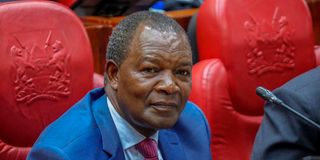
National Treasury Cabinet Secretary Njuguna Ndung’u when he appeared before members of the Finance and National Planning Committee at County Hall in Nairobi on November 8, 2023.
Kenya’s annual spending on Consolidated Fund Services (CFS) is projected to cross the Sh2 trillion mark for the first time in the financial year ending June, elevated by the continued fall of the Kenyan shilling.
The free fall of the local currency, which could hit a low of 166.8 units against the US dollar by June, has seen the National Treasury raise the public debt service budget for the financial year ending June by Sh240.8 billion. This has pushed the projected overall CFS spending for the fiscal year to Sh2.08 trillion.
“Notably, this is the first time the CFS expenditures have exceeded the Sh2 trillion mark and will account for approximately 13 per cent of GDP. This was not expected to occur until FY 2026/27 and shows the impact exchange rate depreciation on external debt servicing expenditures and increased refinancing pressures from bullet payments from commercial debt, resulting to rising debt servicing expenditures and accelerating growth in CFS expenditure,” notes the National Assembly’s Public Debt and Privatisation Committee, in its report on Treasury’s first supplementary budget for 2023/24.
CFS is the account from which the government services public debts, and pays pensions and salaries for State officers in constitutional commissions and independent offices. These are the first payments that the government settles before any other spending.
Should the government spend the projected Sh2.08 trillion on CFS, this would raise spending on the budget line in the current financial year by 59.3 per cent, from the Sh1.3 trillion in 2022/23. This would also see spending to service public debt rise by 62 per cent to Sh1.87 trillion.
Additional funds to facilitate public debt service accounted for 99 per cent of the Sh242.5 billion extra CFS budget Treasury presented in the first supplementary budget for 2023/24.
“This sharp increase is attributable to the impact of the depreciation of the Kenyan shilling against major currencies and increased cost of borrowing due to high interest rates,” said Abdi Shurie, the committee chairman.
The committee raised serious concerns over the sharp growth of public debt service expenses, which are leaving little room for the government to fund development, and wants Treasury to come up with a strategy to address the challenge.
It has also said that there is a need to enhance Parliament’s oversight capacity over CFS expenditures “to promote transparency and accountability”.
“External debt service expenditures will account for Sh216.7 billion (90 per cent) of the increase while domestic debt servicing expenditures will account for Sh24.1 billion (10 per cent). The larger impact of the external debt servicing is accountable to currency depreciation and increased cost of borrowing,” the committee observed.
Treasury had projected to spend Sh775.1 billion on interest payments during the current financial year, but the currency’s continued depreciation saw it adjust the figure to Sh918.8 billion in the supplementary budget it submitted to Parliament in October last year.
“Due to currency depreciation, external debt interest payments will account for 87 per cent (Sh125.6 billion) of these increases while domestic debt interest payments will account for 13 per cent (Sh18.1 billion),” the committee noted.
The government now projects to spend Sh646.36 billion on domestic interest and Sh272.5 billion on external interest payments, the latter being 86 percent higher than projections by June last year. Expenditure to meet maturing debt will also increase by Sh97 billion (11.4 per cent) to Sh947.2 billion, mainly on account of impact of currency depreciation on the $2 billion Eurobond that matures in June.
“On account of adjustment for currency depreciation, external debt redemption payments will account for 97 per cent (or Sh91 billion) of the increase while domestic redemption expenditure will account for 7 per cent (or Sh6 billion),” the report stated.
The government will thus spend Sh566.7 billion (19 per cent up) on external debt redemptions, which include the Eurobond, a Sh61.3 billion syndicated loan from Trade Development Bank and a Sh99.9 billion maturing loan from the Exim Bank of China.
“The increase is primarily attributed to the increase in value of the principal payment for the $2 billion international sovereign bond which is projected to increase by Sh69.9 billion (29 per cent), from Sh241.75 billion to Sh333.6 billion,” the report notes.
The committee observed that as CFS expenditures grow at an annual rate of 22.8 per cent over the past decade, with taxes trailing the expenses at less than half the rate (10.9 per cent).
“Given that CFS is a first charge to the consolidated fund, this growth has limited the fiscal space to undertake other critical government expenditure priorities and caused fiscal inflexibility due to resultant liquidity constraints. As such, there is need to put in place measures to reduce these non-productive expenditures over the medium term,” the committee stated.
Kenya’s public debt grew by Sh1.62 trillion between July 2022 and June 2023, but of the amount, Sh1.12 trillion was growth on external debts on account of increased borrowing, cost of borrowing and depreciation of the shilling.
The Kenyan Shilling depreciated at a 23 per cent rate against the US dollar, 38 per cent against the British pound and 33 per cent against the euro. Regionally, it depreciated by 21 per cent against the Uganda shilling and 12 per cent against the Tanzanian shilling.
“The National Treasury should submit to the National Assembly, within 90 days, a report proposing measures to reduce the debt servicing expenditures by Sh500 billion over a five-year period. The fiscal space created should be sustainable and utilised for development purposes only,” the committee recommended.
The committee also proposed that Parliament should require Treasury to publish, on a quarterly basis, the quantum of new debt acquired, paid and projected payment for the next quarter.
It further recommended that Treasury submit a report to the National Assembly, within 30 days, detailing actual expenditures on salaries and allowances for constitutional and independent office holders for the past five years, and the Auditor-General to undertake a special audit of the allocations and disbursements over the same period and submit a report within six months.
This follows a revelation by the Controller of Budget last year, that Treasury was over budgeting salaries of state officers.









